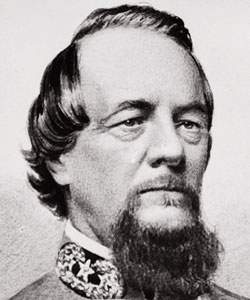Edward Johnson (American National Biography)
Scholarship
During his more than two decades in the army before the Civil War, Johnson also saw duty in Kansas, New York, California, and the Dakota Territory….In July [1861] Johnson assumed command of the Twelfth Georgia Infantry and turned that unit into one of the best regiments in Confederate service. That fall…he marched west from the Shenandoah Valley, taking up a position on a ridge of the Alleghany (Allegheny) Mountains. There on 13 December Johnson won a tough fight that made his reputation, earning him the wreath and three stars of a brigadier general and the fond nickname "Old Alleghany" Johnson.
The new general swore often and with real creative skill. He encouraged his men in battle with a combination of oaths and such inducements as "a stout cane," a club, or even a fence rail, with which he belabored both skulking Confederates and enemy soldiers who were slow to flee. After suffering a severe ankle wound at the battle of McDowell in May 1862, Johnson needed a cane for the rest of his life. Traces of Johnson's personality have survived in the diaries of Mary Boykin Chesnut, who knew him during his recuperation after McDowell. She described him vividly as "a different part of speech"; "red as a turkey cock in the face"; having a head shaped "like a cone, an old fashioned beehive"; and so hopelessly maladroit in his attempts at courting that he "roared with anguish and disappointment over his failures." Johnson never married, and Mrs. Chesnut was fond of the lovelorn general, as were most of his men, to whom his eccentricities supplied entertaining diversion.
The new general swore often and with real creative skill. He encouraged his men in battle with a combination of oaths and such inducements as "a stout cane," a club, or even a fence rail, with which he belabored both skulking Confederates and enemy soldiers who were slow to flee. After suffering a severe ankle wound at the battle of McDowell in May 1862, Johnson needed a cane for the rest of his life. Traces of Johnson's personality have survived in the diaries of Mary Boykin Chesnut, who knew him during his recuperation after McDowell. She described him vividly as "a different part of speech"; "red as a turkey cock in the face"; having a head shaped "like a cone, an old fashioned beehive"; and so hopelessly maladroit in his attempts at courting that he "roared with anguish and disappointment over his failures." Johnson never married, and Mrs. Chesnut was fond of the lovelorn general, as were most of his men, to whom his eccentricities supplied entertaining diversion.
Robert K. Krick, "Johnson, Edward," American National Biography Online, February 2000, http://www.anb.org/articles/04/04-00568.html.



